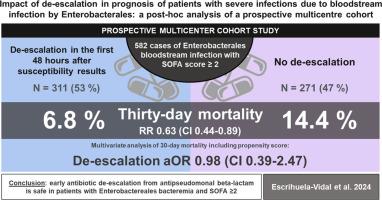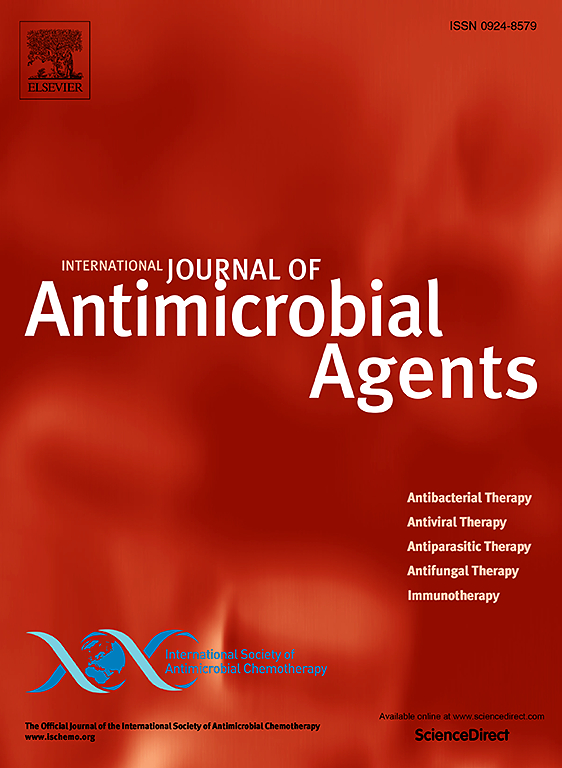肠杆菌血流感染所致严重感染患者的早期抗生素升级:前瞻性多中心队列的事后分析。
IF 4.9
2区 医学
Q1 INFECTIOUS DISEASES
International Journal of Antimicrobial Agents
Pub Date : 2024-09-02
DOI:10.1016/j.ijantimicag.2024.107317
引用次数: 0
摘要
背景:有关肠杆菌引起的血流相关脓毒症降级的数据很少。本研究旨在确定与早期降级相关的因素,并分析降级对 SOFA 评分≥2 的肠杆菌 BSI 患者死亡率的影响:一项前瞻性、多中心队列研究包括了因肠杆菌引起的BSI且SOFA评分≥2分的患者,研究对象为接受积极抗假阳性β-内酰胺类药物治疗的患者;分离出的菌株应对至少一种窄谱抗生素敏感。采用逻辑二元回归法确定了与降级相关的变量。通过计算作为协变量、匹配变量和逆概率治疗加权(IPTW)的倾向评分,控制了混杂因素:在纳入的 582 例病例中,有 311 例(53.4%)实施了降级治疗。中性粒细胞减少(调整后 OR:0.37;95%CI 0.18-0.75)、中心静脉导管(aOR:0.52;95%CI 0.32-0.83)和产 ESBL 分离物(aOR:0.28;95%CI 0.17-0.48)与降级呈负相关,而尿路来源与降级呈正相关(aOR:2.27;95%CI 1.56-3.33)。接受降级治疗的患者的 30 天死亡率为 6.8%(21 人),未接受降级治疗的患者的 30 天死亡率为 14.4%(39 人)(相对风险为 0.63;95%CI 为 0.44-0.89)。在包括倾向评分在内的多变量分析中,降级与死亡率无关(aOR:0.98;95% CI 0.39-2.47),而对泌尿道或胆道来源具有保护作用(aOR:0.31 95%CI:0.09-1.06)。匹配分析和 IPWT 分析显示了相似的结果:这些结果表明,对于肠杆菌属菌血症且 SOFA ≥2 的患者,早期停用抗伪内酰胺类 beta-内酰胺类药物是安全的。本文章由计算机程序翻译,如有差异,请以英文原文为准。

Early Antibiotic De-escalation in Patients With Severe Infections Due to Bloodstream Infection by Enterobacterales: A Post Hoc Analysis of a Prospective Multicentre Cohort
Background
Data about antibiotic de-escalation in sepsis associated with the bloodstream and caused by Enterobacterales are scarce. The objectives of this study are to identify factors associated with early de-escalation and to analyse the impact of de-escalation on mortality in patients with Enterobacterales bloodstream infection (BSI) with a Sequential Organ Failure Assessment (SOFA) score ≥ 2.
Methods
A prospective, multicentre cohort study was performed including episodes of BSI due to Enterobacterales and a SOFA score ≥ 2 who were receiving an active antipseudomonal β-lactam; the isolate should be susceptible to at least 1 narrower-spectrum antibiotic. Variables associated with de-escalation were identified using logistic binary regression. The association of de-escalation with 30-day mortality was investigated. Confounding was controlled by calculating a propensity score used as covariate, as matching variable, and for inverse probability treatment weighting.
Results
Of the 582 patients included, de-escalation was performed in 311 (53.4%). Neutropenia (adjusted odds ratio [aOR] = 0.37; 95% confidence interval [95% CI] = 0.18–0.75), central venous catheter (aOR = 0.52; 95% CI = 0.32–0.83), and extended-spectrum β-lactamase (ESBL)–producing isolate (aOR = 0.28; 95% CI = 0.17–0.48) were negatively associated with de-escalation, and urinary tract source was positively associated (aOR = 2.27; 95% CI = 1.56–3.33). The 30-day mortality was 6.8% (21 patients) in de-escalated patients and 14.4% (39) in not de-escalated patients (relative risk, 0.63; 95% CI = 0.44–0.89). In multivariate analysis including the propensity score, de-escalation was not associated with mortality (AOR = 0.98; 95% CI = 0.39–2.47) and was protective in the case of urinary or biliary tract source (AOR = 0.31, 95% CI = 0.09–1.06). Matched and inverse probability treatment weighting analysis showed similar results.
Conclusions
These results suggest that early de-escalation from antipseudomonal β-lactams is safe in patients with Enterobacterales bacteremia and SOFA ≥ 2.
求助全文
通过发布文献求助,成功后即可免费获取论文全文。
去求助
来源期刊
CiteScore
21.60
自引率
0.90%
发文量
176
审稿时长
36 days
期刊介绍:
The International Journal of Antimicrobial Agents is a peer-reviewed publication offering comprehensive and current reference information on the physical, pharmacological, in vitro, and clinical properties of individual antimicrobial agents, covering antiviral, antiparasitic, antibacterial, and antifungal agents. The journal not only communicates new trends and developments through authoritative review articles but also addresses the critical issue of antimicrobial resistance, both in hospital and community settings. Published content includes solicited reviews by leading experts and high-quality original research papers in the specified fields.

 求助内容:
求助内容: 应助结果提醒方式:
应助结果提醒方式:


